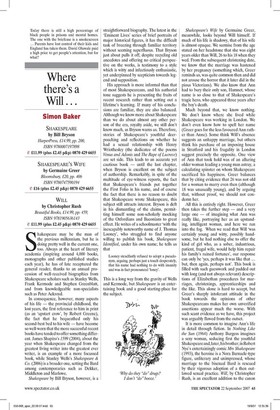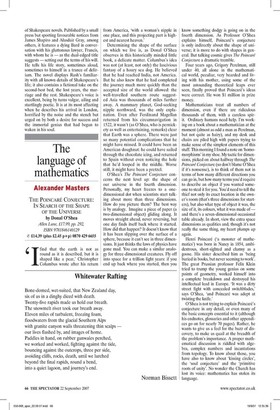Where there's a Will . . .
Simon Baker SHAKESPEARE by Bill Bryson HaiperPress, £14.99, pp. 200, ISBN 9780007197898 © £11.99 (plus £2.45 p&p) 0870 429 6655 SHAKESPEARE'S WIFE by Germaine Greer Bloomsbury, £20, pp. 406 ISBN 9780747590194 £16 (plus £2.45 p&p) 0870 429 6655 WILL by Christopher Rush Beautiful Books, £14.99, pp. 459, ISBN 9781905636143 © £11.99 (plus £2.45 p&p) 0870 429 6655 Shakespeare may be the man of the previous millennium, but he is doing pretty well in the current one, too. Always at the heart of literary academia (inspiring around 4,000 books, monographs and other published studies each year), he has of late recaptured the general reader, thanks to an annual procession of well-received biographies from Shakespeare scholars such as Stanley Wells, Frank Kermode and Stephen Greenblatt, and from knowledgeable non-specialists such as Peter Ackroyd.
In consequence, however, many aspects of his life — the provincial childhood, the lost years, the first reference to him in print (as an 'upstart crow', by Robert Greene), the fact that he bequeathed only his second-best bed to his wife — have become so well-worn that the more successful recent books have tended to offer something different. James Shapiro's 1599 (2004), about the year when Shakespeare changed from the greatest living writer into the greatest ever writer, is an example of a more focussed book, while Stanley Wells's Shakespeare & Co. (2006) is a broader one, setting the Bard among contemporaries such as Dekker, Middleton and Marlowe.
Shakespeare by Bill Bryson, however, is a straightforward biography. The latest in the 'Eminent Lives' series of brief portraits of major historical figures, it has the difficult task of breezing through familiar territory without seeming superfluous. That Bryson just about pulls it off, despite recycling old anecdotes and offering no critical perspective on the works, is testimony to a style which is witty and infectiously enthusiastic, yet underpinned by scepticism towards legend and supposition.
His approach is more informal than that of most Shakespeareans, and his authorial tone suggests he is presenting the fruits of recent research rather than setting out a lifetime's learning. If many of his conclusions are familiar, they are also balanced. Although we know more about Shakespeare than we do about almost any other person of the era, royalty aside, we still don't know much, as Bryson warns us. Therefore, stories of Shakespeare's youthful deerpoaching and reflections on whether he had a sexual relationship with Henry Wriothesley (the dedicatee of the poems Venus and Adonis and The Rape of Lucrece) are set side. This leads to an accurate yet cautious book — until the last chapter, when Bryson is excellent on the subject of authorship. Remarkably, in spite of the multitude of eye-witness reports, the fact that Shakespeare's friends put together the First Folio in his name, and of course the fact that there is no reason to doubt that Shakespeare wrote Shakespeare, this subject still attracts interest. Bryson is deft in his dismantling of the claims, permitting himself some non-scholarly mocking of the Oxfordians and Baconians to great effect. He writes of a schoolmaster 'with the inescapably noteworthy name of J. Thomas Looney', who struggled to find anyone willing to publish his book, Shakespeare Identified, under his own name; he tells us that Looney steadfastly refused to adopt a pseudonym, arguing, perhaps just a touch desperately, that his name had nothing to do with insanity and was in fact pronounced `loney'.
This is a long way from the gravity of Wells and Kermode, but Shakespeare is an entertaining book and a good starting-place for the subject.
Shakespeare's Wife by Germaine Greer, meanwhile, looks beyond Will himself. If much of his life is shadowy, that of his wife is almost opaque. We surmise from the age stated on her headstone that she was eight years older than Will, 26 to his 18 when they wed. From the subsequent christening date, we know that the marriage was hastened by her pregnancy (something which, Greer reminds us, was quite common then and did not arouse the horror that it later did in the pious Victorians). We also know that Ann had to bury their only son, Hamnet, whose name is so close to that of Shakespeare's tragic hero, who appeared three years after the boy's death.
Much beyond that, we know nothing. We don't know where she lived while Shakespeare was working in London. We don't even know how to spell her name (Greer goes for the less favoured Ann rather than Anne). Some think Will's absence suggests an unhappy marriage, but others think his purchase of an imposing house in Stratford and his frugality in London suggest precisely the opposite. One view of Ann that took hold was of an alluring older woman leading a young man astray, a calculating spinster on whom Shakespeare sacrificed his happiness. Greer balances that by citing evidence that 26 was not old for a woman to marry even then (although 18 was unusually young), and by arguing that, without proof, we should not condemn her.
All this is entirely right. However, Greer then takes the further step — and a very large one — of imagining what Ann was really like, portraying her as an upstanding, intelligent woman, and here we run into the fog. When we read that Will 'was certainly young and witty, possibly handsome, but he had nothing else to offer the kind of girl who, as a sober, industrious, patient, frugal wife, would help him repair his family's ruined fortunes', our response can only be 'yes, perhaps it was like that ... but, then again, perhaps not'. This book is filled with such guesswork and padded out with long (and not always relevant) descriptions of Elizabethan procedures for marriages, christenings, apprenticeships and the like. This alone is hard to accept, but Greer's sharply intolerant attitude in the book towards the opinions of other Shakespeareans makes her own unverified assertions appear much the worse. With such scant evidence as we have, this project was arguably flawed from the outset.
It is more common to imagine Ann's life in detail through fiction. In Nothing Like the Sun (1964) Anthony Burgess imagines a sexy woman, seducing first the youthful Shakespeare and, later, his brother; in Robert Nye's entertainingly comic Mrs Shakespeare (1993), the heroine is a Nora Barnacle-type figure, unliterary and unimpressed, whose marriage to the bisexual Bard is rescued by their vigorous adoption of a then outlawed sexual practice. Will, by Christopher Rush, is an excellent addition to the canon of Shakespeare novels. Published by a small press but sporting favourable notices from James Shapiro and Alasdair Gray, among others, it features a dying Bard in conversation with his gluttonous lawyer, Francis, with whom he is — as the dual-edged title suggests — setting out the terms of his will. He tells his life story, sometimes aloud, sometimes to himself in a trance of delirium. The novel displays Rush's familiarity with all known details of Shakespeare's life; it also contains a fictional take on the second-best bed, the lost years, the marriage and the rest. Shakespeare's voice is excellent, being by turns vulgar, ailing and startlingly poetic. It is at its most affecting when he describes his arrival in London, horrified by the noise and the stench but urged on by both a desire for success and the immortal genius that had begun to waken in his soul.


































































 Previous page
Previous page